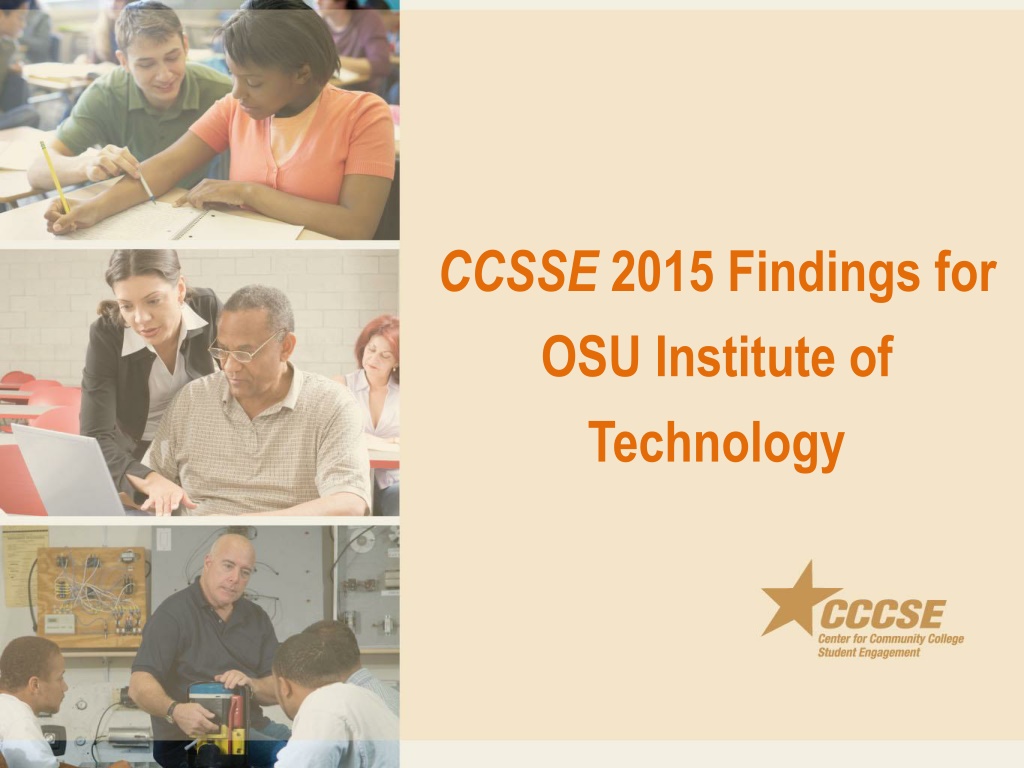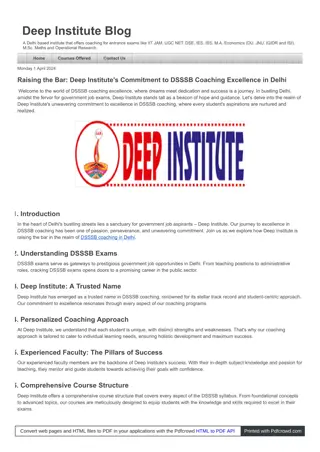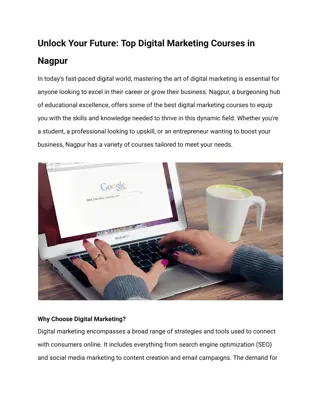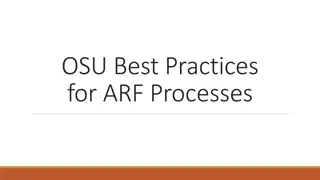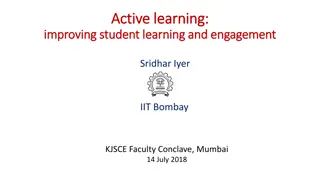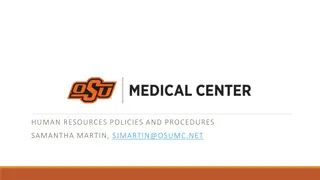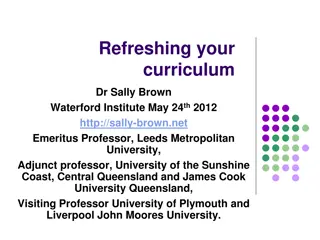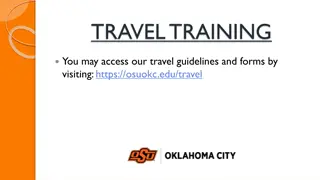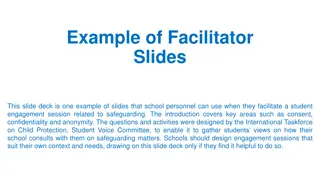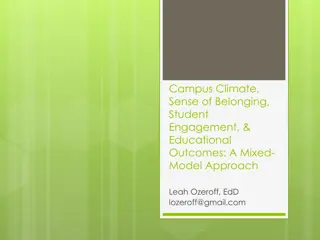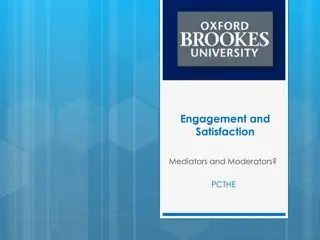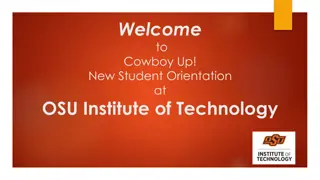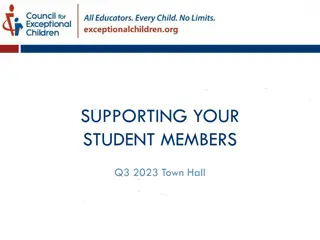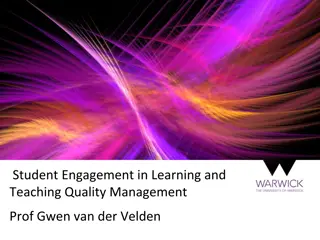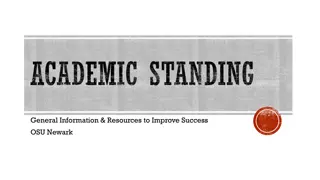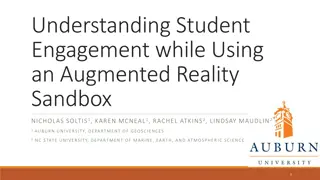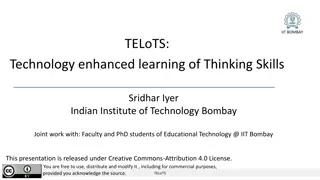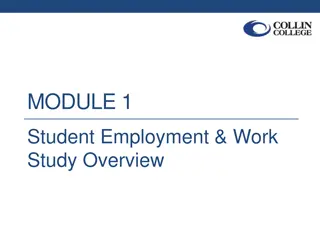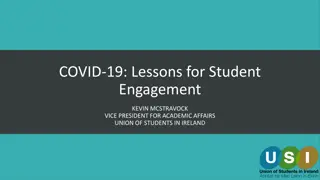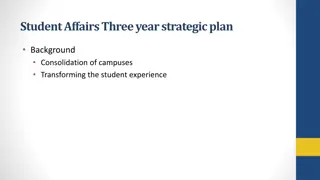Understanding Student Engagement at OSU Institute of Technology
The CCSSE 2015 findings for OSU Institute of Technology provide insights into student engagement, educational practices, and institutional quality. The Community College Survey of Student Engagement (CCSSE) is a valuable tool for assessing and improving community college education. The data highlights student respondent profiles, enrollment status, and educational attainment, emphasizing the importance of engagement in meaningful educational practices for student learning and retention.
Download Presentation

Please find below an Image/Link to download the presentation.
The content on the website is provided AS IS for your information and personal use only. It may not be sold, licensed, or shared on other websites without obtaining consent from the author. Download presentation by click this link. If you encounter any issues during the download, it is possible that the publisher has removed the file from their server.
E N D
Presentation Transcript
CCSSE 2015 Findings for OSU Institute of Technology
Presentation Overview CCSSE Overview Student Respondent Profile CCSSE Benchmarks 2
The Community College Survey of Student Engagement (CCSSE) CCSSE is designed to capture student engagement as a measure of institutional quality. 4
What is Student Engagement? the amount of time and energy students invest in meaningful educational practices the institutional practices and student behaviors that are highly correlated with student learning and retention 5
CCSSE: A Tool for Community Colleges CCSSE helps us Assess quality in community college education Identify and learn from good educational practice Identify areas in which we can improve Basic principles Provides reliable data on issues that matter Reports data publicly Is committed to using data for improvement 6
Student Respondent Profile at OSUIT
Survey Respondents 561 adjusted survey count 94% overall percent of target rate Source: 2015 CCSSE data 8
Student Respondent Profile: Enrollment Status 100% 92% 90% 80% 72% 70% 60% 50% 40% 28% 30% 20% 8% 10% 0% Less than Full-Time OSUIT Full-Time CCSSE 2015 Cohort Source: 2015 CCSSE data 9
Student Respondent Profile: Educational Attainment 0% High school diploma or GED 4% 12% Vocational/technical certificate 11% Associate degree Bachelor's degree 64% Advanced Degree Source: 2015 CCSSE data 10
Student Respondent Profile: Goals 49% 17% Complete a certificate program 70% 18% Obtain an associate degree 27% 26% Transfer to a 4-year college or university 71% 16% Obtain or update job-related skills 50% 30% Self-improvement/personal enjoyment 21% 18% Change careers 0% 10% 20% 30% 40% 50% 60% 70% 80% 90% 100% Primary Goal Secondary Goal Source: 2015 CCSSE data 11
CCSSE Benchmarks for Effective Educational Practice The five CCSSE benchmarks are Active and Collaborative Learning Student Effort Academic Challenge Student-Faculty Interaction Support for Learners 13
Active and Collaborative Learning 50 45.9 42.5 45 38 40 35.1 Percentage of Responses 33.9 35 29.3 28 30 26.5 22.9 25 22.1 22.1 19.1 20 15 12 11.9 9 10 5 1.7 0 Asked questions in class or contributed to class discussions Made a class presentation Worked with other students on projects during class Worked with classmates outside of class to prepare class assignments Never Sometimes Often Very often Source: 2015 CCSSE data 14
Active and Collaborative Learning 80 67.8 66.3 70 60 Percentage of Responses 50 38.8 40 31.3 30 25.2 23 22.2 20 9.2 6.9 10 5.4 2.4 1.5 0 4h. Tutored or taught other students (paid or voluntary) 4i. Participated in a community-based project as a part of a regular course 4r. Discussed ideas from your readings or classes with others outside of class (students, family members, co-workers, etc.) Never Sometimes Often Very often Source: 2015 CCSSE data 15
Student Effort 50 43.4 45 40 35 Percentage of Responses 31.1 30 25 20 13.8 15 10 5.7 3.4 5 2.6 0 Preparing for class (studying, reading, writing, rehearsing, doing homework, or other activites related to your program) None 1-5 hours 6-10 hours 11-20 hours 21-30 hours More than 30 hours Source: 2015 CCSSE data 16
Student Effort 60 50.2 50 39.5 40 Percentage of Responses 37.5 32.1 30 20.8 20 8.6 10 7.6 3.8 0 Worked on a paper or project that required integrating ideas or information from various sources Came to class without completing readings or assignments Never Sometimes Often Very often Source: 2015 CCSSE data 17
Academic Challenge 30 27.8 27.7 25 23 Percentage of Responses 20 15 10.1 10 7.1 5 3.5 0.8 0 Mark the response that best represents the extent to which your examinations during the current school year have challenged you to do your best work at this college (1) Extremely easy -2 -3 -4 -5 -6 (7) Extremely challenging Source: 2015 CCSSE data 18
Academic Challenge 45 38.6 40 36.7 35 30 Percentage of Responses 25 20 14.8 15 9.9 10 5 0 4p. Worked harder than you thought you could to meet an instructor's standards or expectations Never Sometimes Often Very often 19
Academic Challenge 45 38.8 40 37.5 36.6 36.2 35.9 34.8 33.9 33.6 35 32.9 29.1 Percentage of Responses 28.6 30 24.6 23.2 25 20.2 20 17.5 15 10.2 8.6 10 7.7 5.8 4.4 5 0 Analyzing the basic elements of an idea, experience, or theory Synthesizing and organizing ideas, information, or experiences in new ways Making judgments about the value or soundness of information, arguments, or methods Applying theories or concepts to practical problems or in new situations Using information you have read or heard to perform a new skill Very little Some Quite a bit Very much 20
Student-Faculty Interaction 60 55 50 45.2 42.6 41.5 Percentage of Responses 37.3 40 35.6 34.5 33.7 30.7 30 24.7 23.5 21.9 17.3 20 12.1 11.8 10.7 10 7.1 5.7 5.7 3.5 0 Used e-mail to communicate with an instructor Talked about career plans with an instructor or advisor Discussed ideas from your readings or classes with instructors outside of class Received prompt feedback (written or oral) from instructors on your performance Worked with instructors on activities other than coursework Never Sometimes Often Very often Source: 2015 CCSSE data 21
Support for Learners 45 42.7 39.8 40 37.2 36.2 34.4 34 35 31.8 30.5 Percentage of Responses 30 27.5 24.1 23.9 25 22.7 20.8 20.2 20 20 14.4 13.5 15 11.7 10.7 10 3.8 5 0 Providing the support you need to help you succeed at this college Encouraging contact among students from different economic, social, and racial or ethnic backgrounds Helping you cope with your non-academic responsibilities (work, family, etc.) Providing the support you need to thrive socially Providing the financial support you need to afford your education Very little Some Quite a bit Very much Source: 2015 CCSSE data 22
CCSSE Benchmarks for Effective Educational Practice CCSSE Benchmark Scores for OSUIT compared to 2015 CCSSE Cohort and 2015 Top-Performing Colleges 70.0 60.0 59.8 59.4 58.9 58.0 56.6 55.6 50.0 50.5 50.0 50.0 50.0 50.0 50.0 47.4 46.2 45.3 40.0 30.0 20.0 10.0 0.0 Active and Collaborative Learning OSUIT Student Effort Academic Challenge Student-Faculty Interaction Support for Learners 2015 CCSSE Cohort 2015 Top-Performing Colleges* Source: 2015 CCSSE data 23
Benchmarking and Reaching for Excellence The most important comparison: where we are now, compared with where we want to be. 24
Reaching for Excellence at OSUIT More professional development in new and effective teaching strategies. Feedback on academic performance greatly affects retention Build personal connections Raise expectations and communicate them clearly and consistently 25
Questions? The report can be found on the OSUIT website under Institutional Research and Reports & Surveys: osuit.edu/research/ Contact: Curtis Miller, Institutional Research Analyst Michelle Canan, Director of Institutional Research 26
